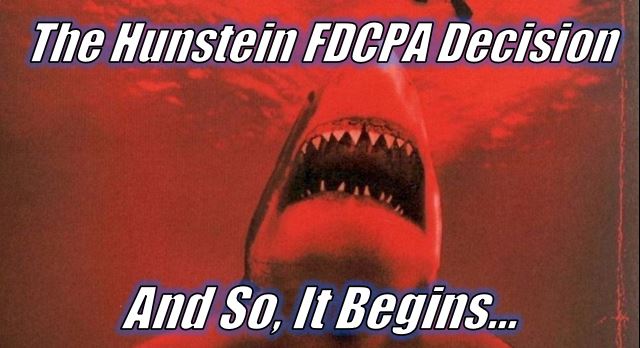Consumer plaintiff’s attorneys are sharpening their knives and the collection industries worst fears appear to be becoming reality. Law360, a Lexis Nexis company, has reported that over 120 new FDCPA lawsuits have been filed since the late April Eleventh Circuit Hunstein FDCPA decision. The majority of these are class action and are exploiting the vendor-based Section 1692c(b) breach created by the ruling.
Within ten days of the Eleventh Circuit Hunstein FDCPA decision, 70 new FDCPA lawsuits were filed in federal courts across the nation. These lawsuits, so far, have targeted the use of vendor-based mailing according to data compiled by the FDCPA, FCRA and TCPA lawsuit monitoring company of WebRecon LLC and Barron & Newburger PC.
An analysis of federal court complaint data shows that nationwide, more than 120 new lawsuits accusing debt collectors of violating federal law through the use of outside mail vendors since the Aprildecision.
To date, the majority of these are reported to be class action and about one-third filed within the 11th circuit itself, covering the southern states of Florida, Georgia and Alabama. Not to be outdone, the state of New York has more filings than the aforementioned states put together and more states are expected to join in.
So far, the primary targets of these lawsuits have been collections agencies, but don’t expect that to last. Lenders and other loan servicing vendors could very easily get dragged into this nightmare by conducting even the most consumer friendly tasks like offering loan modifications if an outside vendor is used for any processing of the letter.
This decision has every loan servicing vendor from foreclosure services to repossession agencies as well looking at their processes for vulnerabilities.
Ironically, should this ruling stand, it is hypothetically possible that filing lawsuits could be safer than sending even the most basic and low level delinquency letter using a vendor.
According to Law360, an en banc rehearing is expected to be filed next week. En banc is French for “in the bench,” which signifies a decision by the full court of all the appeals judges in jurisdictions where there is more than one three or four-judge panel. The larger number sit in judgment when the court feels there is a particularly significant issue at stake or when requested by one or both parties to the case and agreed to by the court.
Not surprisingly, ACA International, the world’s largest debt collection industry trade group, is reportedly planning to lobby the full Eleventh Circuit to review the case. It would be expected that at some level, the American Banker’s Association (ABA) could be lobbying against this as well.
To date, the CFPB has been silent on this ruling, but in numerous bulletins and issued guidance through the years, they have recognized and addressed the vendor mailing process and have had no issues with it.
Unfortunately, as appeals can go, these efforts could end in defeat. In the meanwhile it is likely that the numbers of these lawsuits will explode nationally.
Much like the recent congressional passing of HR 2547, aka “Comprehensive Debt Collection Improvement Act”, which threatens to redefine the meaning of “Debt Collector, the Hunstein decision’s reach could far exceed it’s initial scope and prove disastrous to loan servicers of all types depending solely upon the imagination, creativity and apparent malice of the courts and plaintiff’s attorneys.
Source credit to Jon Hill of Law360
Over 100 New FDCPA Lawsuits Filed over 11th Circuit FDCPA Decision Already – Over 100 New FDCPA Lawsuits Filed over 11th Circuit FDCPA Decision Already – Over 100 New FDCPA Lawsuits Filed over 11th Circuit FDCPA Decision Already
Over 100 New FDCPA Lawsuits Filed over 11th Circuit FDCPA Decision Already












More Stories
From Dealership Desks to Racketeering: Another Miami Fraud Ring Busted
CarMax Settles with DOJ Over Illegal Repossessions
Chinese National Caught in International Auto Loan Fraud Ring